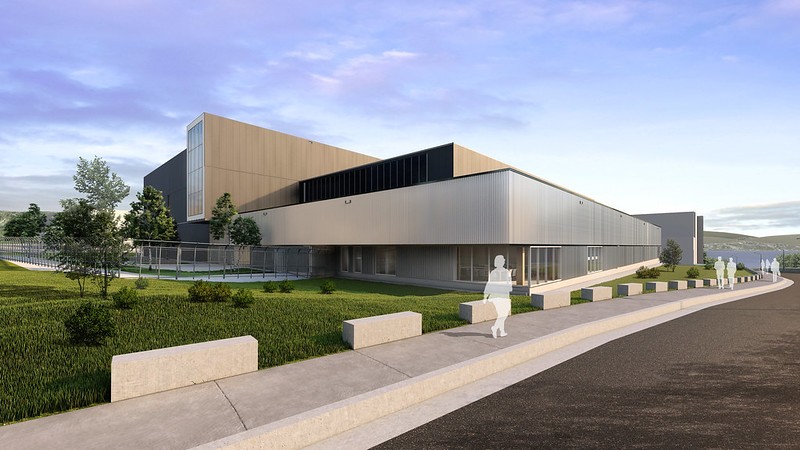Agreements signed to build out future nuclear research
Canadian Nuclear Laboratories believes the agreements with major contractors can set it up for future success.

A rendering shows the Advanced Nuclear Materials Research centre. – CNL
Key Takeaways:
- Many major construction and engineering companies were included in the agreements.
- CNL stated that the agreements allow it to more confidently plan the billions in work it intends to carry out in the coming years.
- The agreements also include components of environmental sustainability, Indigenous relations and local sourcing.
The Whole Story:
Canadian Nuclear Laboratories (CNL), announced a series of partnership agreements to enhance and build the necessary capabilities and capacity to ensure the delivery its corporate strategy.
The partners included AECOM Canada Nuclear Services, Aecon Nuclear, Bird Construction, Bird – Chandos CDP Joint Venture, ECC, ES Fox Limited and Tetra Tech Canada Joint Venture, Hatch Limited, Johnson Controls Canada, M. Sullivan & Son, Stantec Consulting, and WSP Canada.
Boosting confidence to get work done
CNL stated that the agreements will enable it to more confidently plan and deliver its program of work, but also achieve broader organizational objectives including company-wide sustainability targets, improved engagement with Indigenous Peoples, and economic development through the use of local suppliers in the delivery of its projects.
“With a significant program of work on the horizon at the Chalk River Laboratories campus, it is critical that we have a reliable supply chain in place to safely deliver this work on time, on schedule, and according to the high expectations of CNL, AECL and the Government of Canada,” said Joe McBrearty, CNL president and CEO. “These agreements will facilitate improved engagement and relationships with our supply chain at a business-to-business level, which will strengthen our performance and the execution of the work. We can also leverage these agreements to prioritize the use of local suppliers and Indigenous businesses as part of our commitment to more sustainable operations.”
Fred Dermarkar, president of Atomic Energy of Canada Limited (AECL), stated in the announcement that that the quality of the supply chain is essential to the success of both CNL and AECL, which owns the Chalk River Laboratories.
“Reliable partners who can enable the site’s renewal and advance Indigenous reconciliation are key to CNL’s success in achieving its corporate strategy,” said Dermarkar. “I welcome these partnership agreements and look forward to the progress that we shall achieve together.”
Agreements to address environmental and social concerns
CNL officials explained that while most of the work that will be carried out under these agreements will be construction-oriented, the partnerships were established to encompass a much broader program of work, from large-scale environmental impact assessments to energy efficiency improvements.
The agreements aim to prioritize the use of local resources in the delivery of the work, which includes the hiring of local vendors that live and work in the Ottawa Valley, and the use of Indigenous contractors.
As part of its commitment to sustainable operations, CNL has also made it a requirement that environmental stewardship and sustainability are integrated into all areas of the work, including the use of environmentally-friendly materials, practices and organizations, in order to limit the impact of this work on future generations.
CNL also hopes that the agreements could lead to more commercial opportunities for CNL, which plans to leverage these relationships to pursue collaborations on outside projects as a potential delivery partner.
Billions in work on the horizon
In addition to CNL’s existing 10-year capital program, which is funded through a $1.2 billion investment from AECL on behalf of the Government of Canada, and includes the construction of a series of new buildings, such as the Advanced Nuclear Materials Research Centre (ANMRC), CNL is poised to commence a multi-billion dollar program of work. This includes site-wide infrastructure upgrades to improve energy performance; a new facility to advance research related to nuclear medicine, radiopharmaceuticals, and low-dose radiation; ongoing environmental remediation and restoration activities as part of the Port Hope Area Initiative (PHAI); and, the construction of at least six major facilities representing over $2 billion in support of restoring and protecting Canada’s environment.
CLN noted that proceeding with all of these projects requires the collaboration and support of many different companies and contractors, all of which are now in place.
“CNL not only has a series of major projects poised to begin, but many of them are also concurrent, which means that we have to carefully plan and resource these projects if we want them to proceed efficiently,” said Brian Savage, CNL’s vice-president of capital projects, and one of many senior CNL executives who will be involved in managing relations with the new partners. “These strategic delivery partnership agreements gives us long-term clarity on these projects, and cultivate stronger relationships with our supply chain, so we can ensure that they are being effectively managed. Overall, I think these agreements represent a more sophisticated and reliable supply chain strategy, and you will see that reflected in the delivery of the work.”

